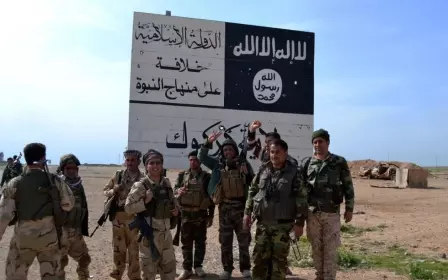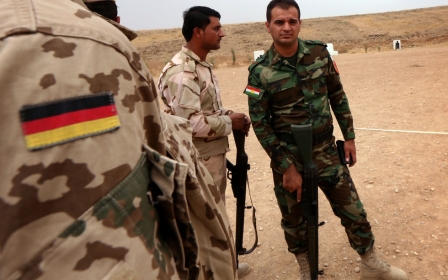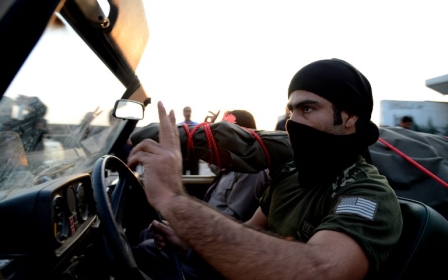EXCLUSIVE: A day on the front line with the Peshmerga in Iraq
KIRKUK, Iraq - The frontline between Kurdish Peshmerga forces and the Islamic State (IS) group in northern Iraq has hardly budged for months, but that all changed on Wednesday morning.
At dawn, thousands of Kurdish Peshmerga forces belonging mainly to the Patriotic Union of Kurdistan (PUK), backed by special counterterrorism units, volunteer fighters, and supporting medical teams gathered by the highway that passes through the village of Haftagar, southeast of Daquq in the Kirkuk province.
Their mission was to launch one of the largest offensives of the last few months and retake 10 villages in one day in hopes of eventually gaining control of the entire province.
Various leading Iraqi-Kurdish generals showed up to lead the amassed troops, with US military staff also present, seemingly there to help and coordinate the anti-IS coalition airstrikes.
On the previous night, the streets of Kirkuk city had been unusually quiet and empty. The inhabitants knew of the offensive and largely stayed indoors as thousands of security personnel deployed across the city to prevent any IS suicide attacks aimed a thwarting the advance.
Ultimately, IS launched a pre-emptive attack at the front line at 4am (2:00 GMT) while the convoy of Peshmerga forces was still speeding down the highway, hoping to reach the front line 50 kilometres away.
Only the flames of Kirkuk’s famous burning oil wells lighted up the horizon. As the sun started to rise over the desert, more Peshmerga fighters continued to stream in. Some walked, others drove, a few even took selfies. Villagers gathered on heaps of dirt or on roofs to try and catch a glimpse of the action.
Though unable to push ahead with the troops to the fighting line, Middle East Eye watched at the front line (1km behind the fighting line), as explosions sounded in the distance.
First came the sound of Russian-made Katyusha rockets launched by the Peshmerga forces, followed by US airstrikes that left a dull bang at the horizon. The occasional exchange of gunfire rattled on from far away. After some 30 minutes, the announcement that the first village had been taken rang through the waiting ranks.
At the front line, officials from the US army stood on top of the dirt hills dug to overview the fighting line, while US army veterans volunteering for the Peshmerga stood at the bottom. There was no contact between the official US army and the volunteers.
“I was in Kobani [in Syria] with the YPG [People’s Protection Units] and now I’m here with the Peshmerga in Kirkuk. I served in Afghanistan,” said an American volunteer, who wore a pin of the Kurdish PKK leader Abdullah Ocalan on his uniform.
Another American volunteer fighting with the Peshmerga proudly donned a Kurdistan Workers Party (PKK) uniform, despite his country considering the group a terrorist organisation.
“Iraq doesn’t exist anymore,” he told MEE. “I served in Iraq after 2003. We went in, f**ked up this country and look at it now: IS is using American weaponry, raping women, burning villages. I’m ashamed. I am here to finish what we started, but we are no longer American boots on the ground. We are with the Kurds now.”
“I feel a kind of energy that I never felt before when I was serving the US army in Iraq. I am here against the will of my government, but I am fighting for what is right,” he added.
There are believed to be at least 100 Americans fighting alongside Kurdish forces in Syria, and possibly even more in Iraq, although accurate numbers are hard to tally. Most have either a military background or troubled lives back home.
“After I returned from [active service in] Iraq, my wife left me. I put a gun to my head and almost killed myself, until I found a new purpose here,” he said.
The conditions the US fighters find here are far from easy. Despite the US assembling an anti-IS coalition last summer, progress has been slow.
Even once IS militants retreat, they tend to leave improvised explosive devices (IEDs) behind. Sweep teams that pushed on ahead of the main fighters incurred casualties. Within hours of the offensive, two Peshmerga fighters were killed instantly while trying to dismantle a device. The loud explosion roared back to the front line, slowly souring the mood. An hour later, General Wasta Rasul announced another casualty when he returned from the front line.
“The sweep teams just called me to move my troops into the first village,” he told MEE. “These villages are at a strategic location to encircle IS and cut their supply routes. This area, if not liberated, poses a danger to the main road from Kirkuk to Baghdad and the Kurdish and other villages adjacent to the areas occupied by IS.”
Political representatives from all the major Iraqi Kurdish factions soon began to arrive at the scene. Aso Mamend, a member of the PUK politbureau, and Mohamed Haji Mahmoud, a veteran Peshmerga fighter and socialist leader, drew large crowds.
'ISIS Hunting Club' in force
As the offensive progressed, machines were rolled in to help three Kurdish divisions dig around the main road and attack the enemy on different fronts.
Supplies of katyusha rockets soon rushed in, carried through by fighters wearing the insignia of “ISIS Hunting Club,” an American paramilitary organisation.
By 9am local time, the Kurdish forces had managed to take four villages from IS.
“[The Peshmerga] could overrun IS easily, but the central Iraqi government in Baghdad doesn’t want to see us gain ground because we are taking back our lands ethnically cleansed during Saddam’s Arabisation campaigns,” said Sirwan Maaruf, a representative of the PUK at the European Parliament.
The tensions in Iraq between the Kurds and Arabs run deep. The so-called Arabisation campaigns began in the 1980s when Saddam Hussein enacted a forced mass movement of both Kurds and Arabs in an attempt to dilute Kurdish dominance in parts of the country.
While the contested city of Kirkuk was due to have a referendum on its future in 2007, this has long been delayed. Kurdish forces seized the city last year from the Iraqi army. Allegations of Kurdish abuses, carried out against Arab villagers in recaptured areas, are unlikely to have warmed sentiments.
But despite reservations from Baghdad, General Wasta Rasul told MEE that US air support was becoming more frequent.
“American warplanes are arriving faster than they used to,” he said. “We started with nothing and now I have modern weaponry. This fills me with hope.”
He also stressed that his forces could defeat IS in months if they were given control of the Iraqi army’s weapons stockpile and said that allegations of abuses were untrue.
“Behind my front line, there are 50 Arab villages. I am making sure they live in peace. Driving them out is not our aim,” he said.
Smouldering rubble, shady rest
The once-busy front line, where so many had gathered a few hours earlier, began to empty. MEE joined fighters rolling out to villages taken from IS. The calm contrasted strikingly with the mayhem in the villages after the fighting. Buildings used by IS were destroyed by coalition airstrikes, abandoned mud houses were smouldering after rockets had hit them. Rubble, tin roofs, glass and bent iron were spread out over the entire village.
In Albu Najem, the first village that was taken, Peshmerga forces were taking a rest in the shade. Their faces, smiling, bore the marks of exhaustion, sweat, sand and the thin pieces of ash filling the air. The smell of kerosene, oil, smoke and dust, and the roaring sound of passing tanks, digging machines and huge armoured vehicles could not bother them. One Peshmerga fighter even started praying in the midst of this madness. Kurdish digging machines started demolishing the village to clear the IEDs and mines IS had planted.
While Albu Najem was still smouldering, the Peshmerga fighters rushed to grab the sandwiches Sirwan Maaruf had brought them. They shared stories from the fighting.
“I returned when we reached the fifth village. Others pushed on until the tenth. Nearby me, an IED exploded, killing our captain.”
It was not the first casualty he had witnessed in the last year. His brother had died fighting IS and many of his family members had been killed in suicide attacks in Kirkuk.
According to General Rasul, by the close of operations the Peshmerga had taken about 250 square kilometres from IS. He says that only four fighters were killed on his side, exclusively by IEDs left by IS. He later told MEE that he saw IS take the dead bodies of at least 40 militants with them to Hawijah.
“The coalition airstrikes also killed a lot of IS fighters and nobody could find their remains,” said Rasul.
“We achieved our goals. I ordered 19 digging machines to construct a new line of defence in front of the tenth village. This was a good example of cooperation between Peshmerga, counterterrorism units and coalition airstrikes.”
The PUK’s EU representative Maaruf was also quick to praise the offensive.
“This was only the beginning,” he told MEE. "The operation will continue until we reach the borders of historical Kurdistan. Then we will focus on defence. We will not push further into predominantly Sunni Muslim Arab towns and villages. That will be up to the Iraqi army. We are fighting for Kurdistan, not for Iraq,” he added.
Such objectives, however, are likely to fall foul of both Sunni and Shia Arab Iraqis and they bode badly for the prospects of a united Iraq emerging from the current chaos.
“At the beginning of 2015, 2,000 IS-fighters stood ready to attack us and take Kirkuk, but we want to pin down democracy here, through a secular political system that protects every citizen, regardless of his or her ethnicity or religion,” General Rasul said ahead of the offensive.
“If the central Iraqi government thinks that we are giving our martyrs for nothing, then they are wrong. We will never give up Kirkuk,” he added.
New MEE newsletter: Jerusalem Dispatch
Sign up to get the latest insights and analysis on Israel-Palestine, alongside Turkey Unpacked and other MEE newsletters
Middle East Eye delivers independent and unrivalled coverage and analysis of the Middle East, North Africa and beyond. To learn more about republishing this content and the associated fees, please fill out this form. More about MEE can be found here.




